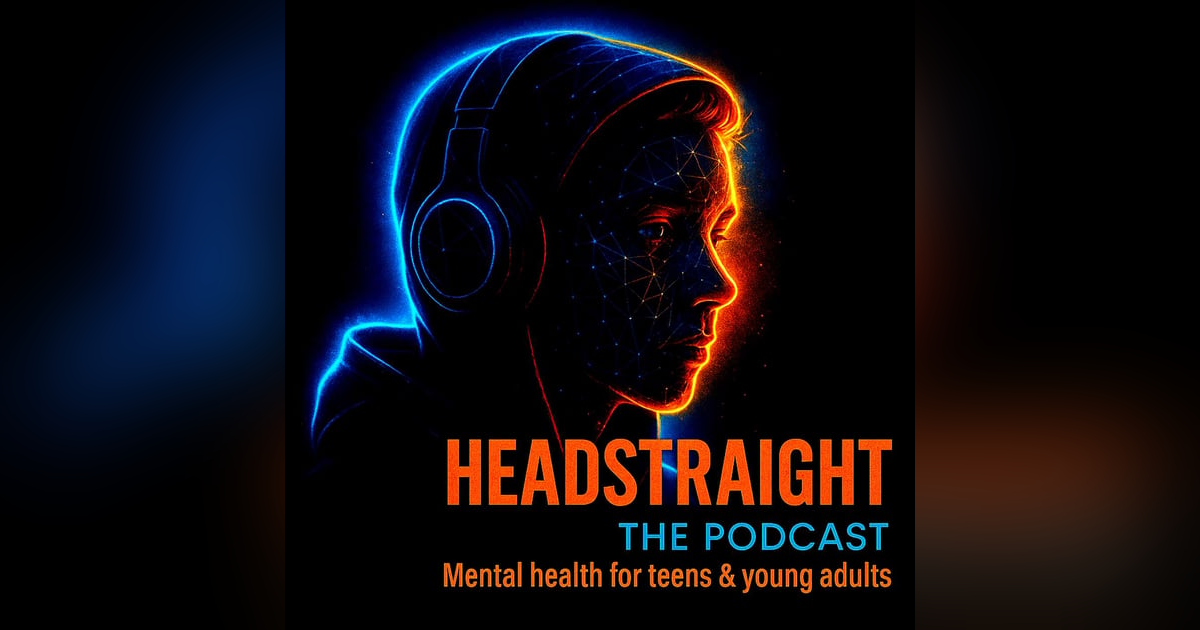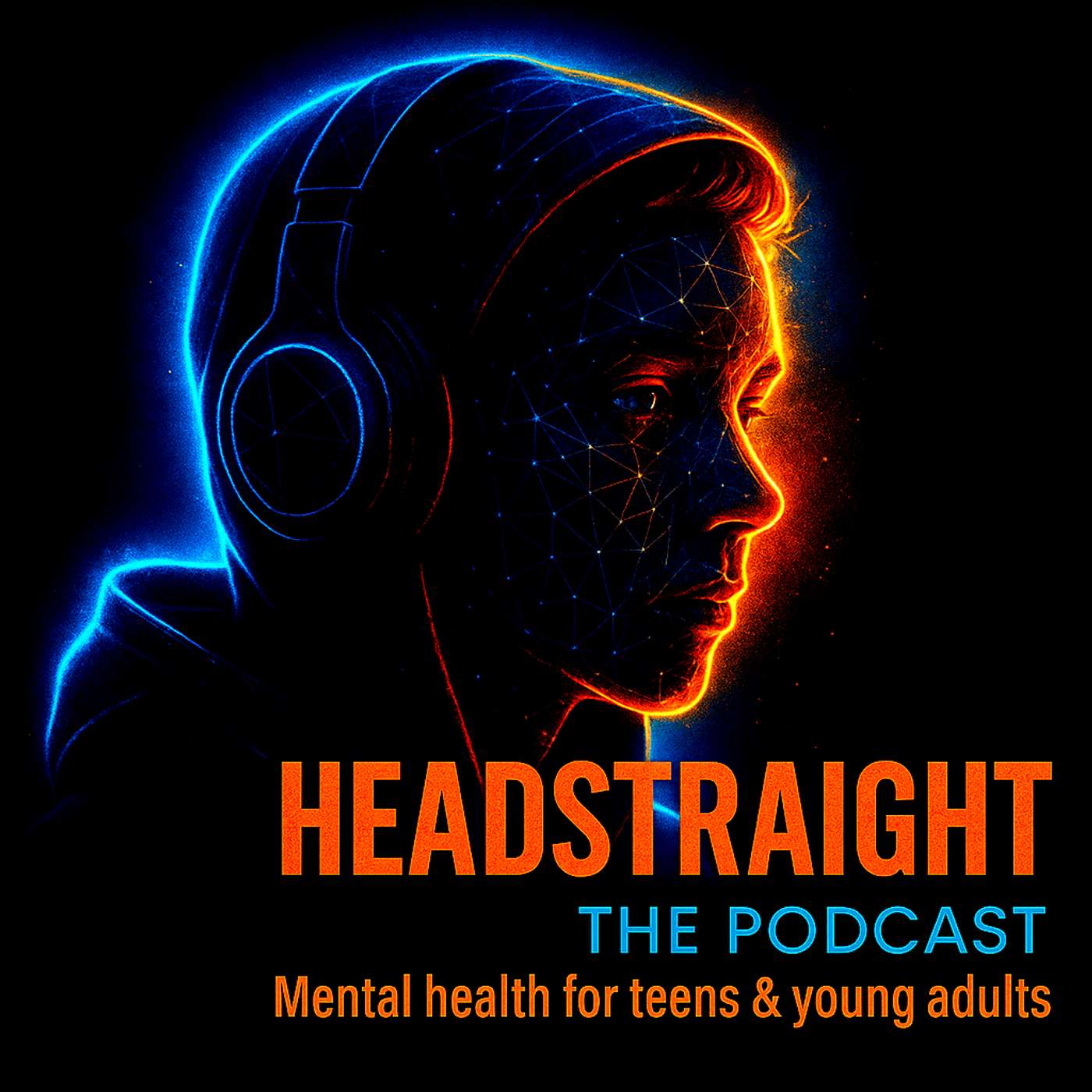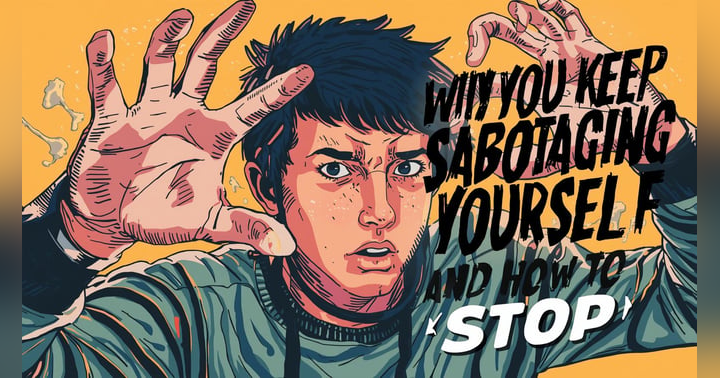Why You Blow Things Up: Breaking the Self-Sabotage Loop


Have you ever noticed how self-sabotage can prevent your success? For many teens and young adults, it manifests as excuses, procrastination, and ‘faking it’ — masking deeper feelings of fear and self-doubt. This behavior, if left unchecked, can drain your confidence and chip away at emotional well-being and self-esteem.
In this episode, hosted by Mark Taylor, we’ll delve into why self-sabotage isn’t just laziness - it's a safety mechanism your brain switches to on autopilot. We’ll connect it to teen mental health and discuss how short-term comfort and self-criticism can evolve into long-term setbacks. You’ll learn why overcoming self-sabotage feels so challenging, especially when you've already lost motivation.
More importantly, you will gain practical strategies for building self-control, building self-reliance, and making healthier choices in the face of fear. We’re about facing uncomfortable truths, cutting through mental challenges, and offering honest guidance for teens. Join us as we equip you with the tools to combat fear, create positive habits for your mental well-being, and truly feel safe as you move forward.
Want to get involved?
I’d love to hear from you:
- Send me a message → headstraight.co.uk/contact
- Leave me a voice note → headstraight.co.uk/voicemail
- Share your feedback by leaving a review (it helps more young people find the podcast) → headstraight.co.uk/reviews/new
Explore more from Headstraight:
- Read the blog version of every episode, packed with extra insights on self-sabotage, motivation, resilience, and mental health → headstraight.co.uk/blog
- Find out more about me, the host, and why I started this podcast → headstraight.co.uk/about
Need support right now?
If you’re struggling with anxiety, depression, or in crisis, visit our Resources page
for helplines, mental health services, and support options available in the UK and across the world.
Mark:
My name's Mark, and you're listening to Head Straight. Hello, you lot, and welcome back to episode one of season three. Welcome back indeed. Yeah. Right.
Mark:
So today, what we're talking about is why you keep sabotaging yourself, and we're gonna look at how to stop this. But first things first, you need to know something. Sometimes the person getting in your way isn't your parents, your mates, or the school, or even the system. It's you. So think about it.
Mark:
You've got plans. You've got tools. You've maybe even got the momentum. And then you ghost it. You delay it.
Mark:
You avoid it. Or you blow it up completely. And afterwards, you just sit down in a bit of a mood and ask yourself, why do I keep doing this to myself? Now the thing that you need to know is that's sabotage. And before you start thinking, great.
Mark:
This just means I'm rubbish. I'm crap. I'm never gonna do well. Hold up. This isn't about being weak or lazy.
Mark:
This is your brain's way of keeping you safe. Now this sounds a bit twisted. Yeah. But it makes sense once you see it. So today, we're gonna be breaking it down.
Mark:
We're gonna take a look at why you sabotage even when you genuinely want to succeed. We're gonna take a look at the sneaky short term payoffs that keeps you hooked into this behavior. And then we're gonna take a look at three tools to stop tripping yourself up and to actually start backing yourself instead. But we're not gonna get anywhere unless we actually understand what sabotage really is. Now you need to know, it isn't random destruction.
Mark:
It's actually protection. Now think about it. You finally sit down to revise, but instead of opening your book, you reorganize your desk, you scroll TikTok to look for the best study hacks. Now this isn't laziness. That's avoiding the fear of facing the work.
Mark:
Or maybe you meet someone you like, but instead of leaning in, you joke at your own expense and you pull away before it gets close. Maybe it's easier to ruin it yourself than risk rejection, yeah? Or maybe you sign up for the gym. You even buy the gear, but on the day, you convince yourself that everyone's just gonna stare at you, so you don't go. Now that's sabotage.
Mark:
Not because you don't want it, because trying properly means that you could fail properly, and failure hurts. So before you go any further, I just want you to stop for a second and think. Where do you see this happening? Where do you pull back right when you actually want it to go forwards? Now let's take a look at those short term payoffs I mentioned.
Mark:
Here's something that most people don't realize. Sabotage works. Not long term, not in ways that make you proud, but in the moment, it delivers. Put off starting an essay until the night before? The payoff is you get to avoid the stress of facing it today.
Mark:
Walk away from a group project halfway through? Maybe the payoff is that you escape the fear of people criticizing your work. If you laugh at your own idea before anyone else can, maybe the payoff for this is that no one gets the chance to shoot it down. That little hit of relief you feel, that's your brain cashing in on the short term win. You get comfort.
Mark:
You get escape. You dodge discomfort for another day. But there's a catch, and here it is. Short term payoffs steal from your long term future. Every time you take an easy escape, you sabotage your own progress, self belief, and growth.
Mark:
You protect yourself in the moment, but you rob yourself of who you could be in the future. So, again, just take a moment. Think back. What was the last sabotage you pulled on yourself? And what tiny wind did you actually get out of it?
Mark:
Now there's something else that's important to think about, and it's the long term fear. Now here's where sabotage goes deeper. Sometimes it's not about avoiding failure at all. It's about dodging success. Stay with me with this.
Mark:
I know this sounds weird. Why would you be scared of success? Well, because success isn't just shiny trophies and claps from the crowd. It comes with pressure. Success raises the bar.
Mark:
All of a sudden people expect more from you. It makes you visible. Now people notice and with that comes judgment. And success removes excuses. Once you've shown that you can, you can't hide behind I'm just rubbish anymore.
Mark:
So your brain makes this sneaky deal. If I never succeed, I'll never have to face the pressure, the attention, or the responsibility. Now, this isn't weakness. It's a safety mechanism. Your brain thinks it's protecting you from a scarier future by keeping you in the smaller present.
Mark:
Now ask yourself honestly, what feels scarier to you right now? Failing and staying the same or succeeding and having everything change? So let's now get into the ways in which you can change things around. You've been tripping yourself up probably for years, and I get it, because sabotage works. It saves you from rejection, from failure, from looking stupid, but it also keeps you stuck.
Mark:
So let me give you three ways to break the cycle. Now these are actual tools that you can use the next time you catch yourself about to blow it up. The first one is the payoff audit. Now this is something really important for you to understand. Sabotage always comes with a sneaky little reward.
Mark:
Otherwise, you wouldn't do it. So ask yourself, what do I actually get out of messing this up? And be brutally honest. You put off starting coursework until the last minute. The payoff might be that you can blame the deadline, not your ability.
Mark:
You avoid speaking up in a group. The payoff of this is that you never risk saying something wrong. Or maybe you tell people that you didn't revise before an exam. The payoff is you protect your image. If you do badly, then you've got a great excuse.
Mark:
If you do well, then you look like a genius. Do you see it? Every sabotage has a hidden win in the moment. When you drag that payoff into the light, you start to see the game that your brain is playing. And once you see it clearly, then it starts to lose its power.
Mark:
Now the second tool that you can use is the safe to succeed plan. Now this one's pretty big. Most of us only plan for failure. We say things like, what if it goes wrong? What if I flop?
Mark:
But almost no one plans for success. That's why you sabotage because deep down, success actually feels scarier than the future. Success means people notice, it means pressure, and it means no more excuses. So here's what you do. Before you even start, I want you to ask yourself, if this goes well, what's the part that feels scary, and how can I make it feel safer?
Mark:
For instance, you smash a test and suddenly feel the pressure of keeping it up. So reframe it. One grade is feedback. It's not a lifetime sentence. Or for instance, you get picked for a role and the thought of being seen terrifies you.
Mark:
Create a grounding ritual. Maybe use deep breaths, music, or even a stupid private gesture that reminds you I've got this. Worried that success means more responsibility? Well, then write one way that you'll protect your downtime. You don't have to hand over your whole life just because you did well once.
Mark:
When you've already thought it through, the what if it goes right side, it's not the dark hole anymore. It's a lit path. Success stops being terrifying, and it starts being manageable. Now the third thing that you can try is the future self check. Now this is the simplest, but it can have the biggest effect.
Mark:
Before you sabotage, I want you to just stop and ask, what would my future self thank me for? Think about that version of you in six months from now. The current tired you says skip the gym. The future you says even ten minutes matters. Get up and go.
Mark:
The current nervous you says don't send that application. The future you says, send it anyway. At least you'll be in the game. The current overthinking you says, better not say anything. But the future you says, speak.
Mark:
Even if it's messy. At least you were there. Now the magic here is that you actually borrow courage from the version of you who's already done it, and you stop letting the scared smaller version of you now run the show. Now look, none of this makes sabotage vanish overnight. You're still gonna feel the urge.
Mark:
You'll still want that quick escape. But with these three tools, you'll have a way to stop, breathe, and choose differently. And that's the gold right there. Sabotage only works when it's invisible. Once you can see it, name it, and plan for it, you're already free from half of its grip.
Mark:
Now here's something that's really important. Change isn't gonna happen overnight, so expect the awkwardness. This is the part that no one tells you. Stopping sabotage doesn't feel amazing straight away. It feels as awkward as hell.
Mark:
Why? Because you're used to the payoff. You're used to the relief of quitting early, the safety of keeping quiet, the comfort of staying invisible. When you choose differently, your brain goes, hang on a minute. This feels wrong.
Mark:
And that's where most people bail. They mistake awkwardness for failure. But awkwardness is actually the sign that you're growing. Think about it. The first time that you tried to ride a bike.
Mark:
Wobbly, clumsy, uncomfortable, but that was growth. The first time you said no instead of people pleasing. Guilt punched you in the gut, but that was growth. The first time you pushed through the urge to procrastinate, it felt heavy, like dragging yourself through the mud. But that was growth too.
Mark:
Awkwardness is proof that you're stepping out of the old loop. It's your brain catching up to the newer version of you. So when you feel that knot in your stomach, that voice saying, this isn't you. Stop now. Don't run from it.
Mark:
Smile at it because that's the exact moment that you're rewiring the pattern. That's the point that you've never pushed past before. And again, here's the gold. Sabotage feels safe. Growth feels awkward.
Mark:
If it feels awkward, you're not failing. You're winning. So let's just wrap up. Here's the truth about sabotage. It's not weakness.
Mark:
It's not laziness. It's your brain's safety system. It works in the short term because it gives you comfort or escape or protection. But long term, it steals your progress, your self belief, and the future you actually want. Now you've got the tools to fight back.
Mark:
You've got the payoff audit. Drag those sneaky short term wins into the light so that they lose their grip. You've got the safe to succeed plan. Stop planning only for failure and make success feel safer too. And you've also got the future self check.
Mark:
Borrow courage from the version of you who's already walked through it. But let me level with you. Change doesn't come from listening. It comes from doing. So here's your challenge for this week.
Mark:
Pick one area where you know you sabotage yourself. It doesn't matter if it's school, mates, relationships, fitness. Just pick one. Do a quick payoff audit. What's the hidden win that you get when you mess this up?
Mark:
Write one step for a safe to succeed plan. How can you make if it goes right feel less scary? And before you act, run the future self check. What would the future version of you thank you for? Now this is not gonna be perfect.
Mark:
You're still gonna feel the urge to duck out, quit, and pull back. But this time, you have a way to pause, name it, and choose differently. And that's how you stop being your own enemy and start being your own ally. Now remember, sabotage feels safe. Gross feels awkward.
Mark:
If it feels awkward, that's not failure. That's proof that you're changing. Now let's have a look at what we're gonna do in the next episode. Even when you do catch yourself sabotaging, sometimes life still slaps you with the setbacks that you didn't ask for. You mess up.
Mark:
Plans fall apart. Things go sideways. So in episode two, we're going to tackle how to bounce back from failure and setbacks. Because sabotage is about the traps that you set for yourself, but setbacks? That's life testing you, and how you respond makes all the difference.
Mark:
So ready for the next step? Of course you are. Join me in the next episode.













